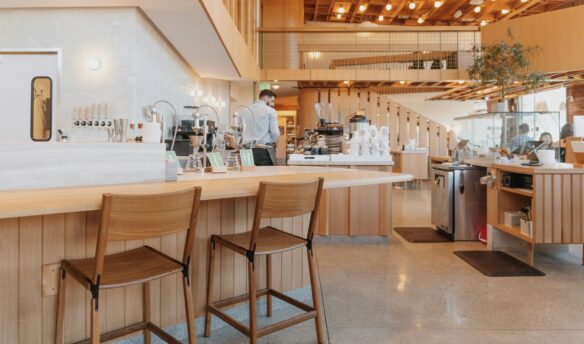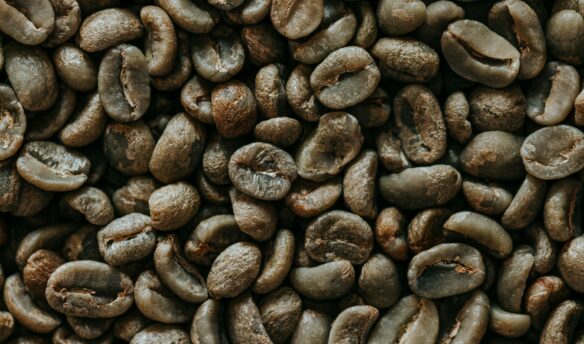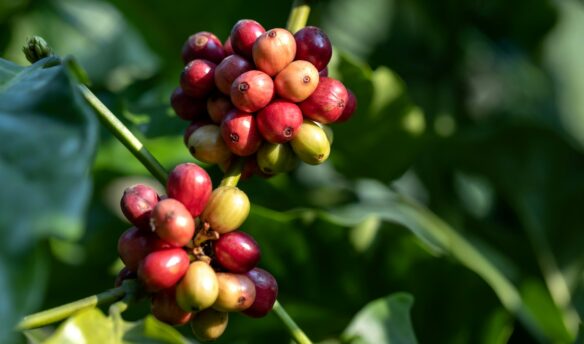It’s a coffee news tasting menu! Today, we’re publishing bitesize reports on:
- A new catalog of robusta coffees
- Vietnamese farmers are moving away from coffee
- More coffee acquisitions!
- Recording artist The Weeknd teams up with Blue Bottle
- New—hopefully more sustainable—ways to package coffee
‘World Coffee Research Launches Robusta Variety Catalog’ – via Daily Coffee News
Seven years ago, World Coffee Research (WCR) published its Arabica Coffee Varieties Catalog, a guide indexing various arabica varieties grown around the world. Now, ten years later, WCR has done the same for robusta.
“Since our founding over ten years ago, WCR has worked to empower farmers by making tools available to choose the right varieties for their farms and their markets—varieties that deliver high yield and better-tasting coffee in the long term,” WCR’s Chief Executive Officer Dr. Jennifer “Vern” Long said in an announcement. “And, now that robusta comprises 40% of the coffee produced and marketed globally, we saw the need to support farmers by creating this tool.”.
The catalog, a free tool available in English and Spanish, profiles 47 varieties of robusta, which were chosen for inclusion “because of their economic, historical, cultural, or genetic importance.” WCR notes that the catalog is incomplete as there are still large gaps in data for many robusta varieties.
‘Coffee Drinkers Pay More as Farmers Prefer Durians in Vietnam’ – via Bloomberg
A Bloomberg survey shows Vietnam’s harvest likely fell this year as farmers turned to more profitable fruit such as durians. Farmers are shifting away from robusta coffee plants, despite a growing global market for robusta as roasters and consumers look to cheaper coffee options in the face of high inflation.
The survey indicates that the harvest dropped by 7% from last year, despite robusta futures in London increasing by 36%. “Actual output was lower than people had forecast,” said Phan Hung Anh, an exporter from Quang Minh Coffee Trading. “Growers invested less in their coffee farms because their eyes were fixed on growing durians and other profitable fruit.”
Read the full story on Bloomberg here or at Yahoo! News here.
‘Minnesota-Based Folly and Philtera Join FairWave Coffee Group’ – via Daily Coffee News
In the late 2010s, coffee businesses were being bought up at a rapid pace. We saw large, established companies buy up smaller, trendier ones: Peet’s (and its owner, JAB Holdings) did it with Intelligentsia and Stumptown, and Nestlé did it with Blue Bottle. Recently, Westrock Coffee acquired specialty roaster Bixby “to appeal to younger US consumers by tapping into Bixby’s influencer-endorsed specialty coffee brands.”
On a smaller scale, Kansas City-based holdings company FairWave Holdings continues to acquire small specialty companies in the Midwest. FairWave announced they would be investing in Minnesota-based Folly Coffee and Philtera Cold Brewed Coffees to add to a list that includes Up Coffee Roasters and Spyhouse Coffee Roasters.
According to its website, FairWave describes itself as a “brew of distinct brands united by our passion for local specialty coffees and experiences.” Each brand is said to maintain its own individual identities and focus while utilizing shared resources. “By partnering with FairWave, we will have access to incredible green coffee globally, increased capabilities, a shared system of best practices across like-minded local coffee brands, and back-of-house business support,” said Folly and Philtera co-founder Rob Bathe, who will now serve as vice president of sales and business development for FairWave in Minnesota.
FairWave isn’t the only group making news this week: Texas-based Cherry Coffee Shop announced it would take over wholesale and ecommerce company Novel Coffee Roasters. Like FairWave, the two companies will function as separate businesses with different approaches to coffee but under one brand.
‘The Weeknd Teams Up With Blue Bottle For Coffee Brand Samra Origins’ – via Sprudge
Another celebrity coffee brand launches! The Canadian singer The Weeknd, also known as Abel Tesfaye, is partnering with Blue Bottle Coffee to launch Samra Origins, “a brand and product line celebrating Ethiopian culture and excellence in coffee.”
Samra Origins pays tribute to Tesfaye’s mother, for whom the brand is named, and his family heritage. “Growing up, I watched my mother perform Buna Tetu, a traditional Ethiopian coffee ceremony,” Tesfaye said in a press release. “This sensory experience helped shape my understanding of community and taught me to always honor my roots. Samra Origins is a true passion project that I hope will inspire curiosity and encourage support for Ethiopia’s people, while also spreading the warmth and friendship so ingrained in Ethiopian culture.”
The project will begin with a limited release of a naturally-processed coffee from the Oromia region produced by Wolde Faye Koricha that came seventh at the 2022 Ethiopian Cup of Excellence. For an insightful discussion on the possibilities and pitfalls of this collaboration (Blue Bottle is owned by Nestlé, which has a history of child labor scandals and environmental negligence), check out Cxffeeblack’s Instagram post, where co-founder Bartholomew Jones is digging into the pros and cons of this partnership.
More News
‘Brazilian Specialty Coffee Producers Close US$20 million at Specialty Coffee Expo’ – via Global Coffee Report
‘2023 Hawaii Coffee Association Conference Coming to Kauai’ – via Daily Coffee News
‘Coffee Plantations Bad for Nutrition in Generalist Bird Species’ – via Bird Guides
‘ICO Seeks to Boost Coffee Sector Awareness of New EU Deforestation Regulations’ – via World Coffee Portal
The Week in Coffee Unionizing
- Internal emails from Starbucks show that corporate management was worried about negative publicity following a grease trap spill that precipitated a strike by workers at a store in Ithaca. “We have to solve these condition issues because we also keep getting media on the store condition there,” one executive wrote to another. Despite being in a prime location, the company permanently closed that store after workers there voted to unionize. “It was retaliation for the strike we went on because we were being forced to work in unsafe conditions,” said one barista who worked at the store. “They didn’t care [before]. They cared all of a sudden now when we’re making national news.” Starbucks denies the charges.
- Judges on a US appeals court “expressed skepticism” that Starbucks’ firing of seven union leaders in Memphis, Tennessee, hurt organizing efforts. According to Reuters, the three-judge panel “appeared open” to the company’s argument that its actions didn’t violate federal law. The National Labor Relations Board lawyers argued that “union support inevitably dies” when organizers are fired, but 6th US Circuit Court of Appeals judge Chad Readler said, “It was the opposite of ‘died,’ it came to life,” and noted that the store unionized just a few months after the firings.
- On May Day, or International Workers’ Day, five Starbucks stores filed for union elections. That same day, workers across the country marched in on regional corporate offices, protesting the company’s refusal to negotiate a union contract. “We would much rather be in the store making coffee and being able to go home and live our lives,” a Starbucks worker in Atlanta said. “But instead, we have to be outside in the rain, in the wind and, y’know, in the blazing sun because Starbucks will not legally come to the table—which they are legally obliged to do.”
Coffee and the Climate Crisis
One of the biggest sustainability problems in coffee is how we present things to the end consumer. Many current solutions, from packaging to to-go cups, have environmental and practical downsides that make widespread implementation difficult.
For example, plastic—which lines most to-go cups and retail coffee bags—is made from oil, and recycling is hit-and-miss (if it’s available at all). Compostable substitutes are constantly improving, but many municipalities lack processing facilities for compostable items, and design constraints impair their use—many compostable cups can’t withstand hot liquids. Last week, several brands announced several new products to address these issues.
Atlanta-based WinCup released a hot beverage cup that it claims is compostable and can handle hot coffee. A bioplastic known as PHA (polyhydroxyalkanoate), derived from fermented canola oil, lines the inside of the cup to keep it from collapsing when a hot liquid is added. Furthermore, the company claims the cups are fully compostable at home or in a commercial facility, breaking down entirely “in a matter of months.”
For an even more natural approach, a German-based company called GaeaStar launched a 3D-printed single-use terracotta cup “made from dirt.” Inspired by Indian cups known as kuhlars that have been used for 5,000 years, these new vessels are made from a mix of dirt, salt, and water. They can be made using 60% less energy than paper or plastic alternatives and are ten times stronger than paper cups. CEO Sanjeeve Mankotia calls them a “fine china experience with the convenience of disposability.”
Coffee pods are often the focus of environmental ire, and for good reason: plastic pods are hard to recycle, while compostable ones suffer from the same issues as all compostable plastics: not breaking down and releasing methane in landfill, where most end up. Rosiro Group BV developed a material called Solinatra that could offer a solution.
Made from agricultural and food waste, Solinatra “performs and feels like traditional plastic” but doesn’t use food crops like many bioplastics. Most importantly, Solinatra is completely compostable. “Our tests showed that a coffee capsule [made from Solinatra] in home composting degrades in the same time as a banana peel, or in around 90 days,” says Simon Girdlestone, co-founder and global technical lead of Rosiro Group.
Dealing with the plastic already out in the world is the goal of Joe Coffee Company in New York, which has partnered with Better Packaging Company to create mailers from 100% ocean-bound plastics. Collected from coastal communities in Southeast Asia, the mailers “use 75% less CO₂ than a virgin plastic product and 88% less than a virgin compostable bag,” according to a press release from Joe Coffee. “They also have a lower carbon footprint than any paper package or recycled product on the market.” Over the course of a year, the company says, the bags will keep the equivalent of 54,200 single-use plastic bags out of the ocean.
Is Coffee Good For You?
Coffee could help keep your brain healthy. Researchers from Australia and China found a positive link between coffee and tea drinking and the thickness of the macular retinal nerve fiber layer, a thin layer of nerve cells that transmit visual information from the eyes to the brain.
The study used the macular retinal nerve fiber layer thickness as a measure of the brain’s health: “The thinner the layer, the higher risk of neurodegeneration,” said research lead Dr. Lisa Zhuoting Zhu from the Centre for Eye Research Australia.
“Our findings indicate if we consume two to three cups of coffee or more than four cups of tea per day, the macular thickness will increase,” said Dr. Zhu.
For the study, published in Nutrients, 35,000 participants from the UK Biobank biomedical database were asked how many cups of coffee or tea they consumed daily over the last year. They then had their macular retinal nerve fiber layer thickness measured and analyzed: coffee drinkers had a significant increase in thickness, especially those who drank two or three cups per day.
Dr. Zhu noted that a medium amount of coffee is best—not too much, not too little—while the type of coffee consumed is also key. “Many studies have indicated that instant coffee could be a risk factor for many health outcomes, including neurodegenerative diseases, which we also found in our study,” Dr. Zhu said. “That suggests it’s better to have good quality coffee.”
Beyond the Headlines
‘I Found the 8th Wonder of the World in a Coffee Shop’ by Mark Moffett
‘Uneven Extraction: The Underbelly of UAE Coffee’ by Ryan Godinho
‘Why Are So Many Young People Joining Labor Unions?’ by Paige Oamek
















